
Vehicles
Scope & Guideline
Transforming Ideas into Automotive Advancements
Introduction
Aims and Scopes
- Innovative Vehicle Design and Manufacturing:
The journal explores new materials and manufacturing techniques, such as the development of hybrid power systems and advanced chassis designs, to improve vehicle performance and reduce environmental impact. - Electric and Hybrid Vehicle Technologies:
Research on electric vehicles (EVs) and hybrid systems is a core focus, including battery management, energy efficiency, and the integration of renewable energy sources. - Autonomous and Connected Vehicle Systems:
The journal covers advancements in automation, vehicle-to-vehicle (V2V), and vehicle-to-infrastructure (V2I) communications, focusing on safety, efficiency, and user experience. - Traffic Management and Urban Mobility Solutions:
Studies related to traffic flow optimization, intelligent transportation systems, and urban infrastructure improvements are prominent, addressing the growing challenges of urban mobility. - Vehicle Safety and Risk Assessment:
The journal emphasizes research on safety systems, risk analysis, and the development of advanced driver-assistance systems (ADAS) to enhance vehicle safety and reduce accident rates. - Sustainability and Environmental Impact:
Research addressing the environmental impact of vehicle technologies, including emissions reduction strategies and sustainable materials, is an integral part of the journal's scope. - Data-Driven Approaches and Machine Learning Applications:
The use of machine learning and big data analytics for vehicle performance optimization, predictive maintenance, and real-time traffic management is increasingly featured in the journal.
Trending and Emerging
- Integration of AI and Machine Learning:
There is a significant rise in research that applies artificial intelligence and machine learning techniques to optimize vehicle performance, enhance safety features, and improve user interactions. - Focus on Sustainable and Green Technologies:
Research on sustainable vehicle technologies, including energy-efficient systems and alternative fuel sources, is gaining momentum as the automotive industry seeks to reduce its carbon footprint. - Advancements in Autonomous Vehicle Technologies:
The development and implementation of autonomous vehicle systems, including navigation, control algorithms, and safety protocols, are increasingly prominent, reflecting industry trends. - Smart Infrastructure and Vehicle Communication:
The integration of smart infrastructure with vehicles for improved traffic management and safety is emerging as a vital area of research, emphasizing the role of connectivity in modern transportation. - Enhanced User Experience and Human Factors:
Research focusing on user experience, including driver behavior, ergonomics, and human-machine interfaces, is gaining traction as vehicles become more automated and connected.
Declining or Waning
- Traditional Internal Combustion Engine Studies:
Research focused solely on internal combustion engines has decreased as the automotive industry pivots towards electrification and alternative fuels, reflecting broader trends in sustainability. - Conventional Traffic Engineering Techniques:
Studies that rely on traditional traffic management methods are being overshadowed by innovative approaches such as machine learning and real-time data analytics. - Static Safety Assessments:
There is a waning interest in static vehicle safety assessments as dynamic and real-time evaluations, particularly those involving autonomous systems, gain prominence. - Basic Vehicle Dynamics Analyses:
While still important, traditional studies on vehicle dynamics without integration of advanced computational techniques or modern technology applications are becoming less frequent. - Single-Discipline Research:
Research limited to a single discipline, such as purely mechanical or electrical systems without interdisciplinary approaches, is declining as the complexity of vehicle systems increases.
Similar Journals
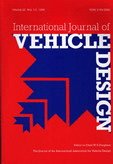
INTERNATIONAL JOURNAL OF VEHICLE DESIGN
Unleashing Creativity in Vehicle EngineeringThe INTERNATIONAL JOURNAL OF VEHICLE DESIGN is a distinguished publication that has been at the forefront of automotive engineering and mechanical design since its inception in 1979. Published by INDERSCIENCE ENTERPRISES LTD in the United Kingdom, this journal aims to foster innovative research and technical knowledge in the field of vehicle design, encompassing various aspects from conceptualization to manufacturing and performance analysis. With an ISSN of 0143-3369 and an E-ISSN of 1741-5314, the journal extends its accessibility to a global audience, although it currently does not operate under an open access model. Recognized for its scholarly contributions, it holds a Q3 ranking in Automotive Engineering and a Q4 ranking in Mechanical Engineering as of 2023, reflecting its position among peers with an increasing impact in the discipline. Researchers, professionals, and students will find valuable insights and cutting-edge research in the articles published, contributing to a deeper understanding of advancing vehicle technologies and methodologies. For inquiries, the journal is based at the World Trade Center Building, 29 Route de Pré-Bois, Case Postale 856, CH-1215 Geneva, Switzerland, where one can also follow its developments and contribution to the growing body of knowledge in vehicle design.

Smart Grids and Sustainable Energy
Exploring the Nexus of Technology and SustainabilitySmart Grids and Sustainable Energy, published by SPRINGER NATURE, is a pivotal open-access journal dedicated to advancing the knowledge and application of smart grid technologies and sustainable energy solutions. Serving as a key resource in the fields of Economics and Econometrics, Electrical and Electronic Engineering, and Energy Studies, this journal aims to facilitate interdisciplinary collaboration and innovation. With a commendable Q2 ranking in multiple categories as of 2023, including a top percentile placement in Economics and Econometrics and Electrical Engineering, the journal underscores its significance in driving forward research that combines economic viability with technological advancement. Researchers, professionals, and students will find a wealth of scholarly articles designed to expand understanding of the complex interplay between energy systems, sustainability, and economic factors. For those interested in cutting-edge research with high visibility due to its open-access policy, Smart Grids and Sustainable Energy is an essential addition to the academic landscape.
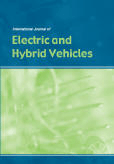
International Journal of Electric and Hybrid Vehicles
Fueling the Transition to Sustainable Transport SolutionsThe International Journal of Electric and Hybrid Vehicles, published by INDERSCIENCE ENTERPRISES LTD, serves as a pivotal platform for scholarly discourse within the automotive engineering and renewable energy sectors. Established in 2007, this journal focuses on advancing research related to electric and hybrid vehicle technologies, encompassing innovations in design, performance, and environmental sustainability. With its rankings reflecting a Q3 status in Automotive Engineering and Fuel Technology, along with a Q4 in Renewable Energy, Sustainability and the Environment, it occupies a significant space within the academic community. Researchers, professionals, and students can benefit from its comprehensive coverage of theoretical and practical applications. Though not open access, its articles contribute valuable insights and advancements that drive the global transition towards greener transportation solutions. As the journal converges towards its 2024 goal, it remains committed to the dissemination of high-quality research that shapes the future of sustainable mobility.
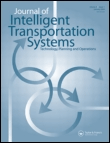
Journal of Intelligent Transportation Systems
Advancing the Future of Transportation TechnologyThe Journal of Intelligent Transportation Systems is a premier peer-reviewed journal published by Taylor & Francis Inc, focusing on cutting-edge research in the fields of transportation systems and intelligent technologies. With an ISSN of 1547-2450 and an E-ISSN of 1547-2442, this journal stands out with its impressive impact, consistently ranking in the Q1 Quartile across multiple categories such as Aerospace Engineering, Applied Mathematics, and Automotive Engineering, among others. As of 2023, it holds distinguished Scopus rankings, including a remarkable #11 position in Aerospace Engineering, showcasing its significance in shaping contemporary research in intelligent transportation. Targeted at researchers, professionals, and students alike, the journal provides a forum for the dissemination of innovative ideas and technologies that enhance transportation systems’ efficiency, safety, and sustainability. The Journal of Intelligent Transportation Systems has been operating since 2004 and continues to play a vital role in advancing knowledge within its respective areas of study within the United Kingdom and globally.
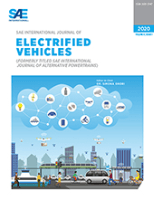
SAE International Journal of Electrified Vehicles
Catalyzing Advances in the Electrified Vehicle SectorSAE International Journal of Electrified Vehicles, published by SAE International, is a pioneering journal dedicated to the field of electrified transportation. Operating since 2020, this journal offers a crucial platform for researchers, engineers, and practitioners who are at the forefront of advancements in vehicle electrification and related technologies. With an ISSN of 2691-3747 and an E-ISSN of 2691-3755, it is indexed within respected databases, showcasing its commitment to high-quality research in Automotive Engineering and Fuel Technology. As part of the Q3 category in the 2023 rankings for both automotive and energy sectors, the journal facilitates the exchange of innovative ideas and groundbreaking studies that contribute to the evolution of the electrified vehicle industry. While currently not open access, the journal offers various subscription options for readers, making valuable insights accessible to a broad audience. Conducting research in this dynamic field, the SAE International Journal of Electrified Vehicles is vital for professionals striving to push the boundaries of technology and sustainability in modern transportation.

SAE International Journal of Passenger Vehicle Systems
Advancing Knowledge in Automotive TechnologyWelcome to the SAE International Journal of Passenger Vehicle Systems, a premier publication in the realm of automotive engineering. Published by SAE International, this journal serves as a critical platform for disseminating high-caliber research focused on the innovation and advancement of passenger vehicle systems. With an impact factor that reflects its growing influence, this open-access journal enhances visibility and accessibility, supporting a diverse readership that includes researchers, engineers, and automotive professionals. Covering a broad scope that incorporates safety, reliability, and mechanical engineering among others, the journal is categorized in the Q3 and Q4 quartiles for various engineering fields, indicating its significance and the potential for impactful contributions to ongoing discussions within the automotive sector. The Scopus rankings further underscore its commitment to quality, placing it within the mid-range of prominent publications. As a valued resource, the SAE International Journal of Passenger Vehicle Systems from 2022 to 2024 offers a vital forum for knowledge exchange, aimed at inspiring breakthroughs in automotive technology and enhancing passenger safety.

Ingineria Automobilului
Connecting Academia and Industry for Automotive ProgressIngineria Automobilului is a prominent journal dedicated to advancing knowledge in the field of automotive engineering. Published by the SOC AUTOMOTIVE ENGINEERS ROMANIA, this journal serves as a vital platform for the dissemination of high-quality research, innovative methodologies, and groundbreaking applications in automotive technology. With an ISSN of 1842-4074, it provides an essential resource for researchers, professionals, and students who are committed to the development and enhancement of automotive systems. Although the journal currently does not offer open access, its contributions are crucial for ongoing advancements in automotive design, safety, and sustainability. The publication aims to foster collaboration between academia and industry, emphasizing the importance of interdisciplinary approaches in solving complex challenges facing the automotive sector today. By facilitating discussions on emerging technologies and engineering practices, Ingineria Automobilului continues to play a pivotal role in shaping the future of automotive engineering.

International Journal of Heavy Vehicle Systems
Driving Innovation in Heavy Vehicle SystemsThe International Journal of Heavy Vehicle Systems, published by INDERSCIENCE ENTERPRISES LTD in the United Kingdom, is a pivotal resource for professionals and researchers in the fields of automotive and mechanical engineering. With an ISSN of 1744-232X and an E-ISSN of 1741-5152, this journal serves as an academic platform dedicated to exploring the latest innovations and technologies pertaining to heavy vehicle systems, including design, performance, and environmental impact. Boasting a Category Quartile of Q3 in both Automotive and Mechanical Engineering as of 2023, it ranks among the growing body of literature in these disciplines, indicative of its commitment to quality research. The journal is widely accessible through diverse open access options, encouraging the dissemination of knowledge within the academic community. By publishing cutting-edge studies and reviews, the International Journal of Heavy Vehicle Systems plays an essential role in advancing our understanding of heavy vehicle technologies, providing invaluable insight for engineers, researchers, and students eager to contribute to this dynamic field.
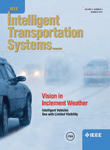
IEEE Intelligent Transportation Systems Magazine
Charting New Paths in Intelligent Transportation SystemsIEEE Intelligent Transportation Systems Magazine, published by the IEEE-Institute of Electrical and Electronics Engineers Inc., is a leading journal in the fields of automotive engineering, computer science applications, and mechanical engineering. With an impressive impact factor reflected in its 2023 rankings, this journal sits in the top quartile (Q1) across multiple engineering categories, making it an essential resource for researchers and professionals dedicated to advancing the intelligent transportation systems landscape. The magazine covers a diverse array of topics from vehicle technology innovations to traffic management solutions, aimed at improving transportation efficiency, safety, and sustainability. Since its inception in 2009, the publication has established a solid reputation for disseminating cutting-edge research and practical applications in intelligent transportation, all while remaining an accessible resource for academic and industrial stakeholders alike. Subscribe today to stay at the forefront of transformative transportation technologies!
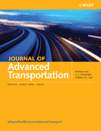
JOURNAL OF ADVANCED TRANSPORTATION
Transforming Ideas into Actionable InsightsJOURNAL OF ADVANCED TRANSPORTATION, published by WILEY-HINDAWI, stands as a pivotal platform in the fields of automotive engineering, computer science applications, economics, mechanical engineering, and strategy and management. With an impressive impact factor and positioned in the Q2 quartile across multiple categories as of 2023, this open-access journal offers researchers, professionals, and students unparalleled opportunities to disseminate and access cutting-edge research. Operating under an open access model since 2017, the journal fosters global collaboration and knowledge exchange, encouraging innovative solutions to contemporary transportation challenges. Its comprehensive scope, spanning converged years from 1979 to 2024, reflects its commitment to addressing the evolving landscape of transport systems worldwide. Researchers from diverse disciplines are invited to contribute transformative studies that advance the field and inspire future endeavors.